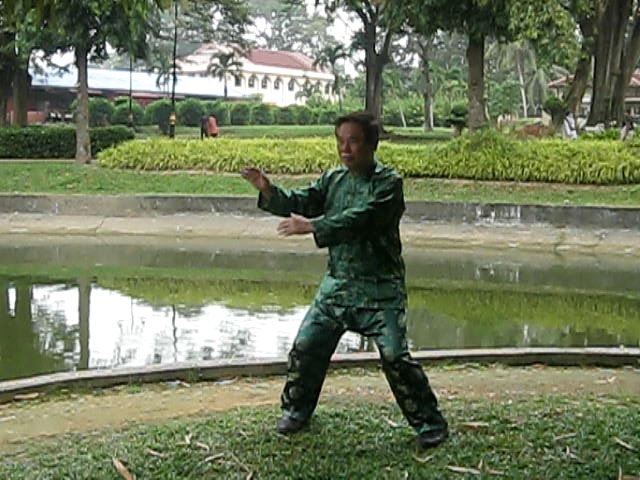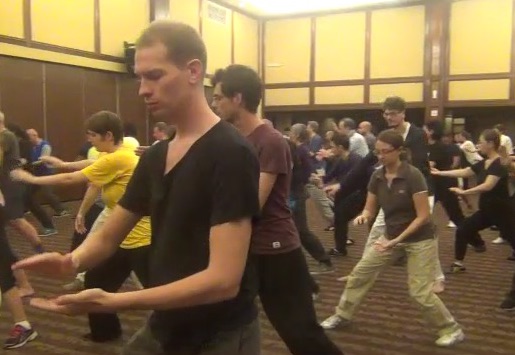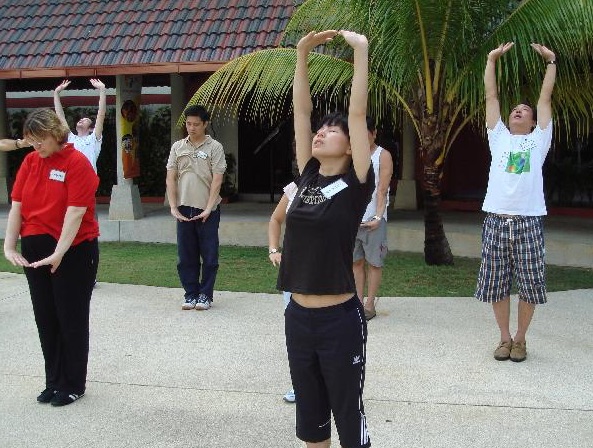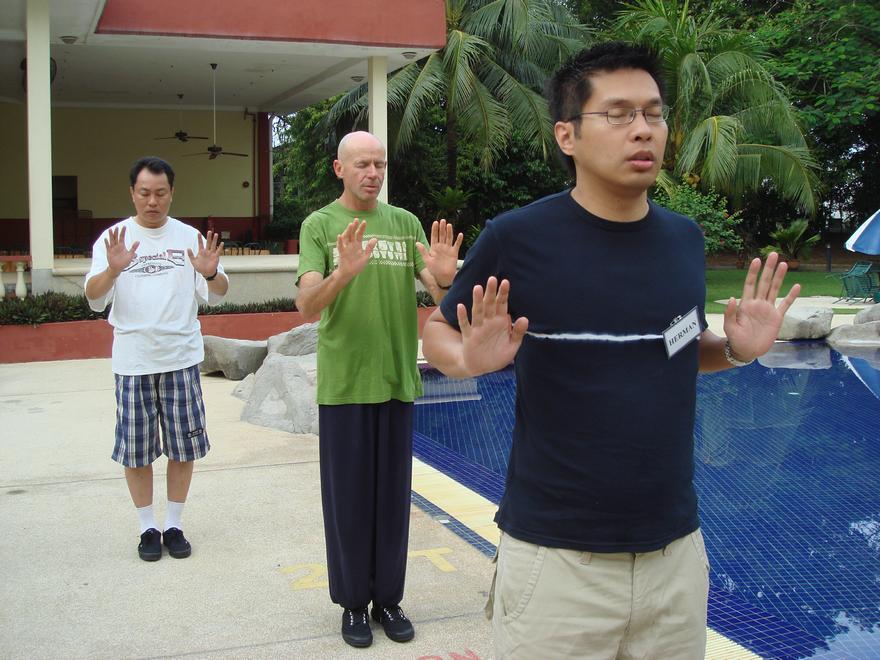SELECTION OF QUESTIONS AND ANSWERS
MARCH 2016 PART 2

Grandmaster Wong performs a Wahnam Taijiquan pattern
Question 1
I had experienced how easily I could handle opponents half and a third my age who daily trained their fighting skills, that I was amazed. I can only imagine how effective I would be once I am able to master what Sifu will transmit on the Intensive Taijiquan Course in Sabah from 25th to 31st March 2016.
— Sifu Angel Perez Oliveras, Puerto Rico
Answer
Certainly it is not without good reasons why you were a sparring champion even before learning from me. You were calm, fast and powerful.
Now you are more calm, faster and more powerful, although you are already a grandfather, but I always marvel at how young you look despite your chorological age. Much credit must go to your qigong training. Your opponents who are half or a third your age would not be able to match you. But if you use Taijiquan techniques against them, they will suddenly become like children.
The secret is to train a Taijiquan combat sequence well and relentlessly apply this combat sequence on them, taking care of your own safety first. We shall have some practice of this strategy during the coming Taijiquan course.
There are four factors in the above strategy. One, you must have a suitable Taijiquan combat sequence, or any combat sequence from our school. Two, you must train this combat sequence well. Three, you must apply this combat sequence on your opponents. Four, you must cover yourself well to ensure safety first. Lacking in any one of the four factors will render the strategy ineffective.
If we have this ever-victorious strategy, why is it that some of our Shaolin Wahnam members who want to be combat efficient but could not beat other martial artists easily? It is because they fail in one or more of the second, third or fourth factor.
My minimum advice is for them to train a combat sequence 30 times a day every day for at least three months. They train 30 times a day for only a few days. Even when they have followed my training advice, when they meet other martial artists, they do not apply their trained combat sequence on them. They bounce about or use other martial art techniques in their sparring, sometimes without their conscious realising, and especially when their opponents rush at them indiscriminatingly. Even if they follow these second and third factors, they fail to cover themselves adequately. So, when their opponents hit them, they throw away all that they have trained and fight like children.
One main reason why they do not train as I have advised following the four factors, is that although they want to be combat efficient, they do not want it enough to put in the time and effort. To me this is reasonable, because although combat efficiency is important if they practice kungfu, it is not top in our priority. We prefer good health, vitality and longevity, and not winning trophies, and they have these benefits.
Are we not worried that others not in our school may steal this secret of ever-winning strategy if we openly mention it in our Question-Answer Series? No, we are not worried. If they are successful in applying this strategy in sparring, we are sincerely happy for them. In fact, they will be helping us to attain one of our aims, which is bringing back the glory and greatness of kungfu, even though they may not be members of Shaolin Wahnam.
However, it will be very difficult for them to achieve this aim. They may know the techniques of the strategy, but they don't have the skills, and they don't even know the difference between techniques and skills. In the Taijiquan course in Sabah, we shall not only revise these skills, but also learn other relevant skills as well as techniques, like what we would do if our opponents manage to fight back, or use other techniques not according to our trained routine.
Question 2
If you have been methodically trained to spar using kungfu patterns, when an opponent attacks you, irrespective of whether he uses kungfu forms or any other martial art forms or use freestyle, you will spontaneously respond with the kungfu patterns that you have been trained in. You will not need to think what pattern to use, or what stance to jump into; you will just respond correctly and spontaneously.
Answer
This is the great advantage I had, and still have. Although I was exposed to other martial arts, my main training was in kungfu, and I used kungfu in my sparring all this while.
In my early years of sparring with martial artists of other styles when I did not know as many techniques then as now, I used two effective tricks, or strategies. One, I chose opponents whom I knew I could defeat. Two, I practiced beforehand the counters to their expected attack. During sparring I just applied my routine of counters on them.

Taijiquan class during Review Course 2015
Question 3
Well, I had done exactly that but using freestyle fighting, so unlearning to "automatically" respond using my old freestyle techniques and skills had been a real challenge. It's been 20+ years of such training. But with the same determination and using much higher level of skills, I had been progressing slowly. Although, I might say It had been the most rewarding experience ever, and that in itself worth all the effort.
Answer
It took me more than 20 years to develop the ever-winning strategy I mentioned above. Actually I did not use this one strategy as a whole, it is a composite strategy as a result of my many strategies that enabled me to remain undefeated in sparring. At the most you and other people who are interested to apply it will need only one year. One cannot be ever-victorious by just knowing the strategy; he must be prepared to spend time and effort acquiring the skills to apply it well.
You have a great advantage over other people. You were already a sparring champion. You already had the champion's skills. What you need to do now is to further enhance your champion's skills, and to change your Taekwondo techniques to your Taijiquan techniques which are superior.
The greatest benefit is not that you will beat other capable opponents as if they were children. It is not even that you can beat them despite they are only half or a third of your age. The greatest benefit is that even at an age when you are already a grandfather, you have the abilities of a young man -- relaxed, calm, joyful, fast and powerful, not just physically but also emotionally, mentally and spiritually.
Question 4
My gratitude for your generosity and patience with me. In time, I will be able to master those skills to a level where Sifu would be proud! I will continue doing my best.
Answer
I am already very proud of you, irrespective of whether you will beat other capable opponents in sparring like children. Your good health, vitality, longevity (a person who is already a grandfather can claim to have, though you are still young in Shaolin Wahnam perspective), and your dedication to our arts are an inspiration to many people.

Lifting the Sky
Question 5
When I do this thought-stopping method, each time I stop a thought I have a burst of chi flow in my neck, and my neck and head start spasming. Is this ok, wu-wei? Or would this be too much chi flow? So is it better to gently tell myself beforehand not to have any sudden bursts of neck chi flow?
— Jorge, Spain
Answer
If you feel the experience is pleasant, it is OK. If you feel uncomfortable or painful, it is not OK. This is a very useful general rule that can be applied to all chi kung exercises.
Yes, this was wu-wei, or being spontaneous. You had the wu-wei after the you-wei, i.e. doing something appropriate, which was stopping your thoughts.
Whether there was too much chi flow or not enough depended on your needs and other factors. The general rule of whether you felt pleasant or uncomfortable could be applied here.
If the chi flow is too much, or if it is too vigorous, it is helpful to tell yourself beforehand not to have too much chi flow or too vigorous a chi flow.
Question 6
Considering that I still have trouble not-intellectualising, would it be best to stop my daily chi kung for the time-being? Actually, I still get a nice chi flow from just doing "Lifting the Sky" by focusing on my form and intellectualising in order to purposefully keep the level low, but I'm not sure if I get much benefit afterwards.
Answer
It is not necessary to stop your chi kung practice for the time being. You just stop intellectualizing.
Even if you don't practice your chi kung, you will still intellectualize. Indeed, practicing your chi kung is a good way to reduce your intellectualizing and eventually stop it.
Not doing something is easier than doing something. Not jumping down from a tall building is easier than jumping down from a tall building. Not hitting your head against a wall is easier than hitting your head against a wall.
Not intellectualizing is actually easier than intellectualizing. You just don't intellectualize. When you intellectualize, a lot of activities happen in you. When you don't intellectualize, all these activities just don't happen
But if intellectualizing has become a habit, you need some effort to stop it. It may not be easy at first, but certainly it can be done. And it is also worth your effort.

Don't Worry, Don't Intellectualize, Enjoy your Practice
Question 7
Regarding the wonderful three-pronged attack you kindly showed me to help clear the blockage around my shoulders and chest; thank you so much. Now I would like to share a wonderful development. My shoulders are now nearly level! And I can feel warmth in my arms! Also, when I simply look in the mirror and gently balance my shoulders, I go into a nice chi flow!
Answer
Congratulations for your achievement. When your shoulders are level, and you stand upright and be relaxed, you create the ideal condition for all your organs and systems to function at their best. If your shoulders are uneven, or if you are tensed, your organs and systems do not function at their best.
When you provide an ideal condition for your organs and systems to function, you can have a nice chi flow readily.
Question 8
So, now I am just worried that I will be having too many chi flows throughout the day, and over-train! How much chi flow is too much? Of course, I do not expect a theoretical number, but a general way to know if I am going to over-train?
Answer
If the chi flows make you feel pleasant, your chi flows are not too many. If your chi flows make you feel uncomfortable, the chi flows are too many. You tell from experience.
It is like eating food. If your eating food makes your feel pleasant, you have not over-eaten. If you feel uncomfortable, you have over-eaten.
You worry and intellectualize unnecessarily. Remember that the three golden rules of practice in our school are not to worry, not to intellectualize, and enjoy your practice.
Enjoy your chi flows. If you don't enjoy the chi flows, cut down the number of chi flows, but don't worry and don't intellectualize.
If you have any questions, please e-mail them to Grandmaster Wong via his Secretary at stating your name, country and e-mail address.
LINKS
Selected Reading
- Taiji Dance and Genuine Taijiquan
- Lesson from Bernie and Sean in Free Sparring
- Why You Haven't Overcome Your Problem
- The Bird in Hua Tuo's Five-Animal Play
- An Shen Pao or Safe-Body Cannon
